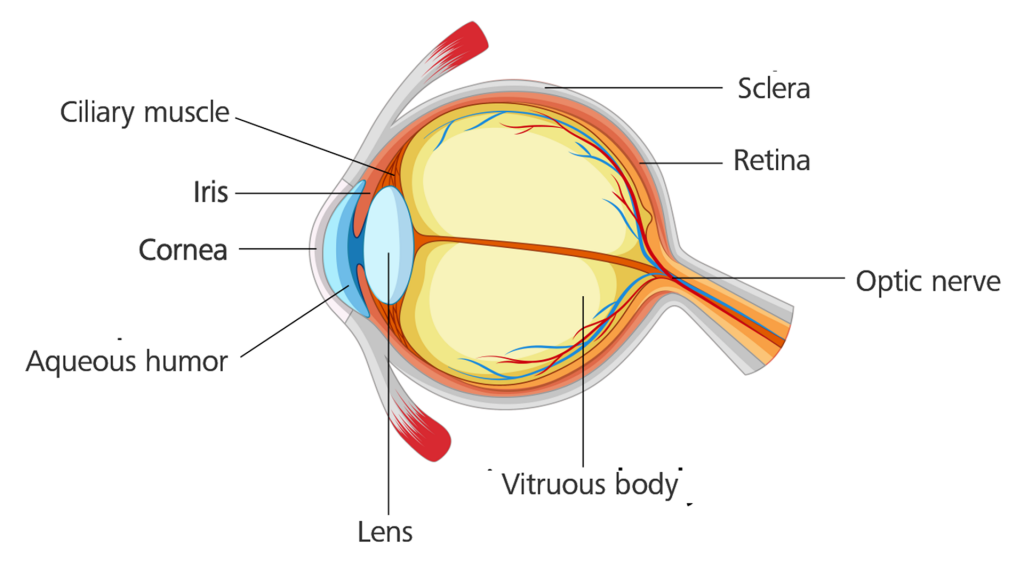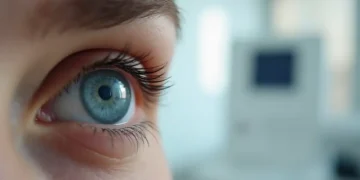Glaucoma is an eye condition that affects over 80 million people worldwide. It can cause permanent damage to your vision and can even lead to blindness if left untreated.
Sometimes, people who have glaucoma delay to treat glaucoma because they don’t experience any symptoms until their vision has already been damaged. That is why it is important to get regular eye exams, even if you don’t think you have glaucoma. In this guide, we will explain what exactly glaucoma is, what causes it, how it is diagnosed, and the type of vision loss you can get with it.
Table of Contents
What Is Glaucoma?
Glaucoma is a group of eye diseases that can damage the optic nerve. This damage can lead to vision loss and blindness.
Most people with glaucoma don’t have any early symptoms. Vision may gradually become affected, and that’s why some people don’t notice the change until after significant damage has occurred.
That’s why it’s important for everyone to have regular eye exams, even if they feel like they “see just fine.” Early detection and treatment of glaucoma is essential to preserving vision.
There are several types of glaucoma. However, the most prevalent type is the one known as open-angle glaucoma.
This type of glaucoma is responsible for about 90% of cases. Some common identifiers of open-angle glaucoma include:
- A gradual loss of peripheral vision, often starting in the outer edges of your field of vision
- The appearance of halos around lights
- Difficulty distinguishing between colors
- Seeing spots or blank patches in your field of vision
Angle-closure glaucoma is a less common type in which the angle where the iris meets the cornea is too narrow or closed. This can cause a sudden increase in eye pressure, leading to blindness if not treated promptly. Symptoms of angle-closure glaucoma include severe eye pain and headaches, nausea, vomiting, blurred vision, and halos around lights.
What Causes Glaucoma?
The exact cause of glaucoma is not known. This best explains why it is often referred to as a ‘mysterious’ eye condition. However, there are several known risk factors that can increase a person’s chances of developing glaucoma. These include:
- Age: Age is a risk factor for glaucoma, and it is more common in people over 60 because the optic nerve becomes more vulnerable to damage as we age. The optic nerve is responsible for carrying visual information from the eye to the brain, and when it’s damaged, vision can be lost.
- Family history of glaucoma: If you have an immediate family member with glaucoma, you may be at increased risk of developing the condition yourself.
- Eye injury or trauma: Any injury to the eye can increase your risk of developing glaucoma. This includes things like blunt force trauma, radiation therapy, and even vigorous contact sports. Injury or trauma can cause changes in eye pressure that could trigger glaucoma.
- Certain medical conditions: People with diabetes, high blood pressure, or a previous eye injury may be at increased risk for developing glaucoma.
- Ethnicity: Glaucoma is more common in African Americans and Latinx people than in other ethnic groups. This is likely because these groups have thinner corneas than people of European descent. Corroded or thin corneas are one known risk factor for glaucoma. Also, Americans of African ancestry tend to have larger optic nerves, which is one reason why they are more susceptible to glaucoma.
How Is Glaucoma Diagnosed?
Glaucoma can be difficult to diagnose because it does not always show obvious signs or symptoms until after significant vision loss. Your optometrist will carry out a series of tests on your eyes during a routine check-up which may detect early signs of glaucoma before any visual impairment sets in.
If they spot anything suspicious, they may refer you for further testing, such as a visual field test or ophthalmoscopy (examination of the back of the eye). If these tests confirm a diagnosis of glaucoma, then you will need treatment to reduce the pressure in your eyes and prevent further damage from occurring.
And when it comes to treatment with glaucoma, the best treatment plan usually involves using a combination of approaches. Doctors typically employ medications, dietary supplements, and sometimes surgical procedures to reduce eye pressure and improve vision.
Medications can be both topical (in the form of eye drops) or oral to reduce intraocular pressure in the eye, while dietary supplements like omega-3 fatty acids promote healthy vision. There are various types of surgery used if needed, including laser trabeculoplasty and trabeculectomy, which help fluid in the eye drain better.
Additionally, regular preventative care can include assessments for early detection and implementation of lifestyle changes, such as wearing sunglasses with UV protection or avoiding certain activities like bungee jumping. All these treatments work together to protect your eyesight from serious damage associated with glaucoma!
What Vision Do You Lose With Glaucoma?
The type and severity of vision loss depend on how far advanced your glaucoma are when it is diagnosed. Early stages may only cause mild blurring around your peripheral vision, which often goes unnoticed unless tested for specifically.
However, as the disease progresses, this can worsen significantly, leading to tunnel vision or complete blindness in one or both eyes, depending on how far advanced it has become. Even with treatment, most people will experience some form of permanent visual impairment. So, it’s important to get regular check-ups with an optometrist even if you don’t think anything is wrong with your sight!
Closing Thoughts
Glaucoma is an eye condition that can cause permanent damage to your sight if left untreated. It can be difficult to diagnose because there aren’t usually any clear symptoms until after significant vision loss has occurred, so visiting an eye specialist regularly for check-ups is essential for early detection and treatment.
At Chelvin SNG Eye Center we understand the importance of regular check-ups with an eye specialist and provide comprehensive eye care services to ensure that our clients have access to the best possible treatment for their eyes. Our experienced team is here to help you take control of your vision health, so don’t hesitate to contact us for more information or to schedule an appointment! Call: +65 6334 2282 or visit us at:
Chelvin Sng Eye Centre – Glaucoma | Cataract Surgery | Eye Specialist
38 IRRAWADDY ROAD
MT ELIZABETH NOVENA SPECIALIST CENTRE,
#06-25, 329563
+65 6334 2282


 Home
Home









